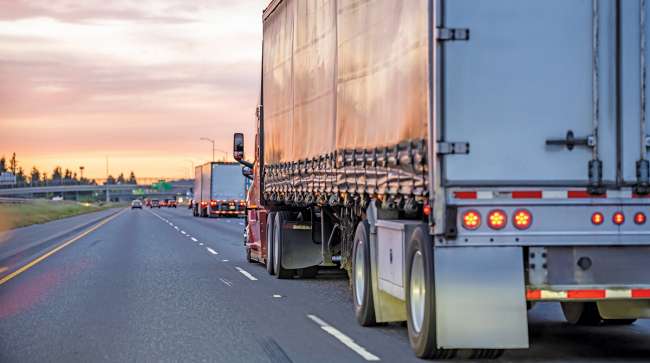Senior Reporter
Trucking Touts Win as CARB Drops Clean Fleets Mandate

[Stay on top of transportation news: Get TTNews in your inbox.]
The California Air Resources Board has backed down on a regulatory proposal that would have required trucking companies to gradually add zero-emission vehicles to their fleets, a dramatic shift that was welcomed by trucking leaders.
Known as the Advanced Clean Fleets Rule, the law would have mandated for certain truck and bus fleets in the state a phased-in deployment of ZEVs in their operations. Separately, California also has proposed an Advanced Clean Trucks rule that requires manufacturers only sell zero-emission trucks in the state beginning in the 2036 model year. Both proposals require the U.S. Environmental Protection Agency to grant CARB a waiver of federal rules to proceed. The state has withdrawn its waiver request for the ACF law, but the ACT proposal remains. Manufacturers have negotiated independently with the state on that proposal, and currently have an agreement in place.
“The Advanced Clean Trucks regulation will still be in effect, [and] it will likely put the onus on truck manufacturers to continue to make zero-emission trucks,” said Mike Tunnell, California-based senior director of environmental affairs/research for American Trucking Associations.
For fleets, however, Tunnell said the waiver withdrawal removes tremendous pressure to adopt a nascent technology that critics say is developmentally not far along enough to meet transportation companies’ needs.
“In some respect, I think as the technology matures there’s still going to be some movement in zero-emissions vehicles,” Tunnell said. “But I think things are going to slow down, and it’s going to take away the situation where fleets in California were going to be required to put them into service where they didn’t even work.”

Spear
“The trucking industry and American consumers can breathe a collective sigh of relief today after CARB finally bowed to reality and shelved its job-killing Advanced Clean Fleets regulation,” said ATA President Chris Spear. “This unachievable mandate would have raised costs and caused disruption throughout our supply chain without delivering the promised environmental benefits.”
The CARB reversal puts more of an onus on truck manufacturers to help advance California’s long-standing efforts to reduce emissions in the state. The ACT Rule requires manufacturers of Class 2b to Class 8 vehicles to sell zero-emission vehicles as a gradually increasing percentage of their annual California model year sales and gives manufacturers flexibility on which vehicle models to electrify.
In a move aimed at striking some middle ground between government and industry, in 2023 an agreement was struck between CARB, the Truck and Engine Manufacturers Association and nine OEMs to “collectively recognize the importance of preserving and protecting the environment; promote the transition of the heavy-duty on-highway commercial vehicle industry to zero emissions; maintain a strong and viable industry; and provide certainty and stability for the industry and its customers.”
The agreement, known as the Clean Truck Partnership, said that EMA and the OEMs will not challenge CARB’s issuance of the regulations, file a petition for review or otherwise challenge any U.S. EPA waiver or authorization granted for such regulations; or file amicus briefs supporting challenges to such waivers or authorizations.
(American Trucking Associations via YouTube)
“The manufacturers still have a lot of capital invested in research and development,” said one source with knowledge of environmental issues. “Where does this put them? They have hundreds of millions of dollars allocated to come up with solutions. They want to sell these trucks to start recouping the research and development dollars they put forward to come up with these technology pathways.”
Complicating matters is the return of Donald Trump to the White House. Trump has committed to rolling back rules aimed at propelling adoption of zero-emission vehicles. CARB officials placed high hopes on both ACF and ACT helping to advance the state’s clean air goals.
Against that backdrop, the Clean Trucks Partnership puts manufacturers “between a rock and a hard place,” the environmental source said. “They can’t speak out, they can’t complain, they can’t legally challenge. With Trump being sworn in... he might undo the whole thing.”

Tunnell
Tunnell added, “I’m sure we’ll hear more on the Advanced Clean Trucks front in a few weeks or months. But right now it’s up in the air.”
Spear said, “We look forward to President-elect Trump rescinding CARB’s remaining unworkable waivers and new leadership at EPA restoring a common-sense approach that balances environmental progress with economic viability. The American Trucking Associations will continue to advocate for rational, nationwide emissions standards that are both ambitious and achievable.”
EMA did not respond to a phone request for comment.
“ATD and America’s heavy-duty truck dealers are pleased and relieved that California has abandoned its completely unrealistic and unworkable Advanced Clean Fleets regulation, which would have forced trucking fleets to adopt zero-emission trucks at levels far above anything that is practical or sensible in today’s market and given today’s significant technological limitations,” said American Truck Dealers President Jacqueline Gelb.
Want more news? Listen to today's daily briefing below or go here for more info:




